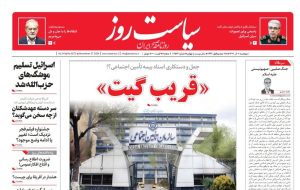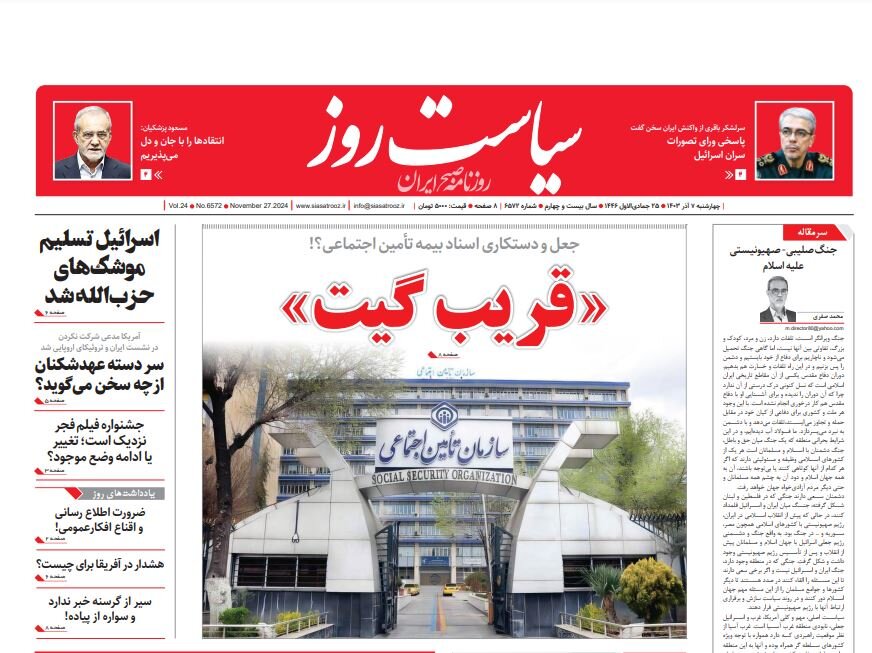Israel’s war and enmity with Muslims predate the Islamic Revolution
Siasat-e-Rooz devoted its editorial to the sinister goals of the West, particularly the United States, and the fake regime. It wrote: The enemies are trying to consider the war in Palestine and Lebanon as a war between Iran and Israel, while before the Islamic revolution in Iran, the Zionist regime was at war with Islamic


Siasat-e-Rooz devoted its editorial to the sinister goals of the West, particularly the United States, and the fake regime.
It wrote: The enemies are trying to consider the war in Palestine and Lebanon as a war between Iran and Israel, while before the Islamic revolution in Iran, the Zionist regime was at war with Islamic countries such as Egypt, Syria, etc. In fact, the fake Israeli regime was at war with the Islamic world before the revolution. The main policy of America, the West, and Israel is to neutralize the West Asia region. It is illogical that some people, both inside and outside, object to Iran’s role in regional issues and crises and accuse Iran of provoking crises. Iran is defending its land against enemies who are greedy of the country. Being on the battlefield can protect Iran against the enemy and strengthen Iran’s friends against their enemies. Israel is on the brink of collapse and the continuation of this path will lead to the end of the Zionist regime.
Jam-e-Jam: There’s global demand to execute Netanyahu
In an analysis, Jam-e-Jam discussed the arrest warrants against Netanyahu and Yoav Gallant by The Hague-based International Criminal Court. It wrote: The Leader of the Revolution, in a meeting with the Basiji members, emphasized that the arrest warrants against Netanyahu and his sacked war minister Gallant is not enough, suggesting that other Zionist criminal leaders should face justice and be sentenced to death. The reference of the Leader of the Islamic Revolution to the necessity of issuing death sentences against Netanyahu and other war criminals of the Zionist regime is derived from the will of two billion Muslims around the world who seek strong punishment against these criminals. The arrest warrant did not reduce the anger of the Muslim nations and the free people of the world. They would expect a more severe punishment for the war criminals. The Leader of the Islamic Revolution also pointed to the inevitable victory of the Axis of Resistance against the Zionist regime. Although this victory will be costly to the Muslim nations in the region, it shows that the will to resist has always prevailed over the arrogant countries throughout history.
Arman-e-Melli: Iran’s new foreign policy strategy
In an interview with Dr. Bahman Arman, an economist, Arman-e-Melli discussed with him the negotiations that Iran and the European trio (Germany, Britain, and France) are about to start on Friday. He said: The reality is that European countries do not enjoy decision-making independence, and the approach that America will take is effective in this regard. In fact, European countries always implement the orders issued by Washington. The Middle East is important for America and other countries in the world in many ways. And Iran is known as the heart of the Middle East. It is unlikely that Iran and Trump would move towards increasing tension. The fact that we think that there will be a lot of tension between Iran and the United States due to Trump’s return to power is due to an emotional outlook and is not based on reality. Trump is well aware that since 60% of the world’s oil reserves are in the Middle East, this region must enjoy sufficient security. Iran wants to end the tension. Meanwhile, Trump, a businessman, looks at Iran as a big market.
Farhikhtegan: Iran can achieve whatever it wants
In a commentary, Farhikhtegan discussed Iran’s achievement in producing 20 percent-enriched uranium in 2010 to operate a research reactor in Tehran that runs on uranium enriched to that level. It said: Iran’s achievement in producing uranium enriched to 20% marks a milestone in the history of Iran’s nuclear activities. It also highlights the failure of the United States and its allies to undermine Iran’s technological progress. America and its allies tried to limit the scientific capability of our country by abusing Iran’s vital need for nuclear fuel. But Iranian scientists aborted this conspiracy by relying on domestic knowledge and power. This U.S. action showed that the main goal was not to solve Iran’s problem but to limit our country’s nuclear capability and drain Iran’s enriched uranium reserves. This experience provides an important lesson for global diplomacy. Reliance on internal strength is the best way to deal with external pressures. Iran’s achievement of 20% uranium production technology is a turning point in the country’s nuclear history and a symbol of scientific progress and national will. This success, achieved under sanctions and unprecedented pressures, showed that Iran can meet its vital needs even in the most difficult conditions.
